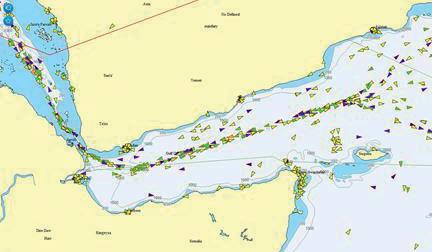
3 minute read
New faces
EMSA STRENGTHENS SUPPORT AROUND SOMALIA AND LIBYA
The European Maritime Safety Agency (EMSA) has agreed to step up its support EU Naval Force operations around Somalia and Libya
The agency has signed two co-operation agreements under the EU’s Common Security and Defence Policy to strengthen maritime awareness around Somalia and Libya.
Operation Atalanta aims to tackle piracy and protect vulnerable vessels and humanitarian shipments off the coast of Somalia, while Operation Irini seeks to enforce a UN arms embargo on Libya.
“By cooperating with EMSA in the areas of maritime security and surveillance, multiple sources of ship specific information and positional data can be combined to enhance maritime awareness for the EU Naval Force (EU NAVFOR) in places of particularly high risk and sensitivity,” says EMSA.
Both operations have already been in force for some time, but the agreements both give more access for the EU Naval Forces to EMSA’s surveillance platforms.
Operation Atalanta has been active since 2011, and at the beginning of the year was expanded to include illegal activities at sea, such as weapons and drugs trafficking.
“EMSA is providing EU NAVFOR with access to an integrated maritime monitoring solution which offers the possibility of consulting vessel position data, central reference databases and earth observation products,” says EMSA.
“This is integrated with EU NAVFOR data – such as vessel risk level based on vulnerability assessments – creating a specifically tailored maritime awareness picture. The new agreement extends the longstanding collaboration with EU NAVFOR for an indefinite period and is an example of how EMSA is serving maritime security and law enforcement communities worldwide.”
Operation Irini was begun in March 2020 to implement an arms embargo against Libya using aerial, satellite and maritime assets.
“The new cooperation agreement allows for access to EMSA’s Integrated Maritime Services platform and in particular to the agency’s Automated Behaviour Monitoring (ABM) capabilities,” says the agency.
“These services help EU NAVFOR officers to keep a close eye on Libya’s ports as well as to monitor the flow of maritime traffic in the area and target specific vessels for inspection based on suspicious behaviour picked up by the ABM tool,” EMSA says.
The European Maritime Safety Agency is a decentralised agency belonging to the European Union.
8 EMSA map of Somalian coast
Permanent security tugboat supplied for River Elbe
A permanently present tugboat is in place to secure the section between Brunsbüttel and Hamburg’s federal state border for the fi rst time.
The tugboat, FAIRPLAY-35, has been supplied by tender winner ARGE Küstenschutz, part of the Fairplay Towage Group.
In late 2021, a tender was drafted by the Elbe-North Sea Waterways and Shipping Office (WSA Elbe-Nordsee) for a permanently present tugboat to harbour in Stade-Bützfleth, be available 24/7 and able to take off on a mission within 15 minutes.
The FAIRPLAY-35 was stationed on the Elbe from April 1 with the Brunsbüttel-Elbe control centre holding mission control and right of instruction on behalf of the Federal Waterways and Shipping Administration (WSV).
ARGE Küstenschultz won another two tenders from the WSV to supply emergency tugboats for the North and Baltic Seas.
Nordic and Baltic operate on the basis of an emergency vessel concept that was implemented by the federal government in 2001.
It provides that multi-purpose vessels operated by the government are stationed in strategically selected locations along the German coast of the two seas so that a damaged ship can be reached within two hours.
An additional land-based towing assistance team of four is also available and can be winched aboard a damaged vessel from a helicopter in case of emergency.






